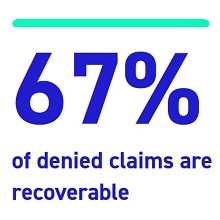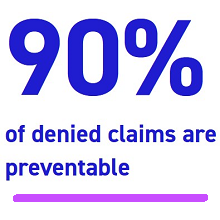HealthLeaders: Leaders Agree, The Revenue Cycle Needs More Denials Management ExpertiseHundreds of leaders were asked which rev cycle tasks require the most subject matter expertise.More than 550 healthcare financial and revenue cycle leaders were asked which revenue cycle tasks require the most subject matter expertise and denials management took the top spot, according to a new HFMA survey commissioned by AKASA. According to the survey shared with HealthLeaders, respondents could select up to five out of 15 tasks, and while denials management lead the pack, interestingly, coding broke ahead of prior authorization:
Seeing denials management at the top of the list is no surprise as HealthLeaders has dubbed 2023 as the year of reducing denials for revenue cycle. An abundance of recent studies have been pointing to the growing concern of denials for revenue cycle leaders as more pressure is put on these leaders to help increase their bottom lines. On the same note, another survey this year showed that revenue cycle leaders consider denials management and prior authorizations to be the most time-consuming revenue cycle tasks. As denial rates continue to increase, establishing a streamlined denials management strategy is key for healthcare organizations to reduce complexity and workload for staff and avoid reimbursement delays. “Revenue cycle leaders are being challenged to do more with less as they’re strapped for resources, while also experiencing higher volumes of claims,” said Amy Raymond, VP of revenue cycle operations at AKASA. “To continue to improve yields and meet revenue goals in this environment, leaders must leverage automation and AI-driven solutions that help reduce burnout for existing employees and ensure workflows still get done reliably.” Pulling in more expertise for both inpatient and outpatient coding tasks is also not surprising. As the payer/provider relationship grows more strained, leaders need to begin tightening up coding processes. For example, organizations will need to stand firm on compliance and reimbursement when its revenue cycle team submits evaluation and management (E/M) claims with modifier -25 as Cigna recently dropped a new policy. According to Cigna, it created a new policy requiring submission of office notes with all claims including E/M codes 99212, 99213, 99214, and 99215 and modifier -25 when a minor procedure is billed. Cigna said it will deny payment for these E/M services reported with modifier -25 if records documenting a significant and separately identifiable service are not submitted with the claim, and at the time, medical groups were quick to show their frustration. As for other tasks in the revenue cycle that require the most subject matter expertise, the survey showed the following:
Commissioned by AKASA, the survey fielded responses from 556 chief financial officers and revenue cycle leaders at hospitals and health systems across the United States through HFMA’s Pulse Survey program between July 8, 2022, and August 2, 2022.
Amanda Norris is the Revenue Cycle Editor for HealthLeaders. |




